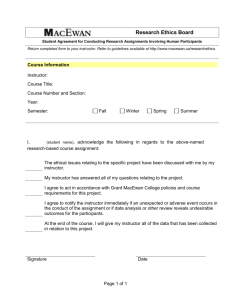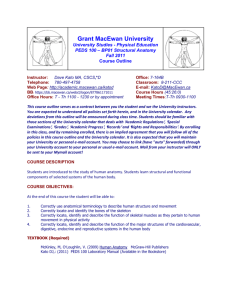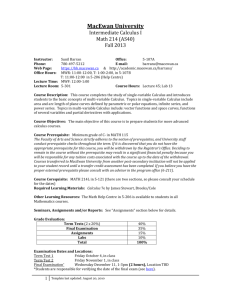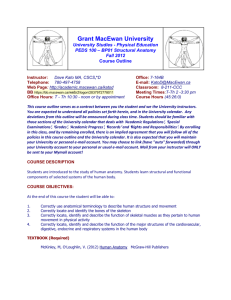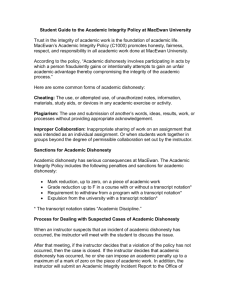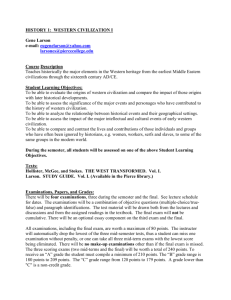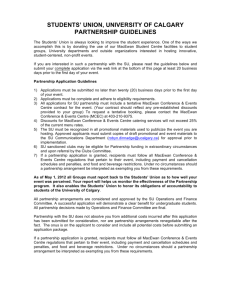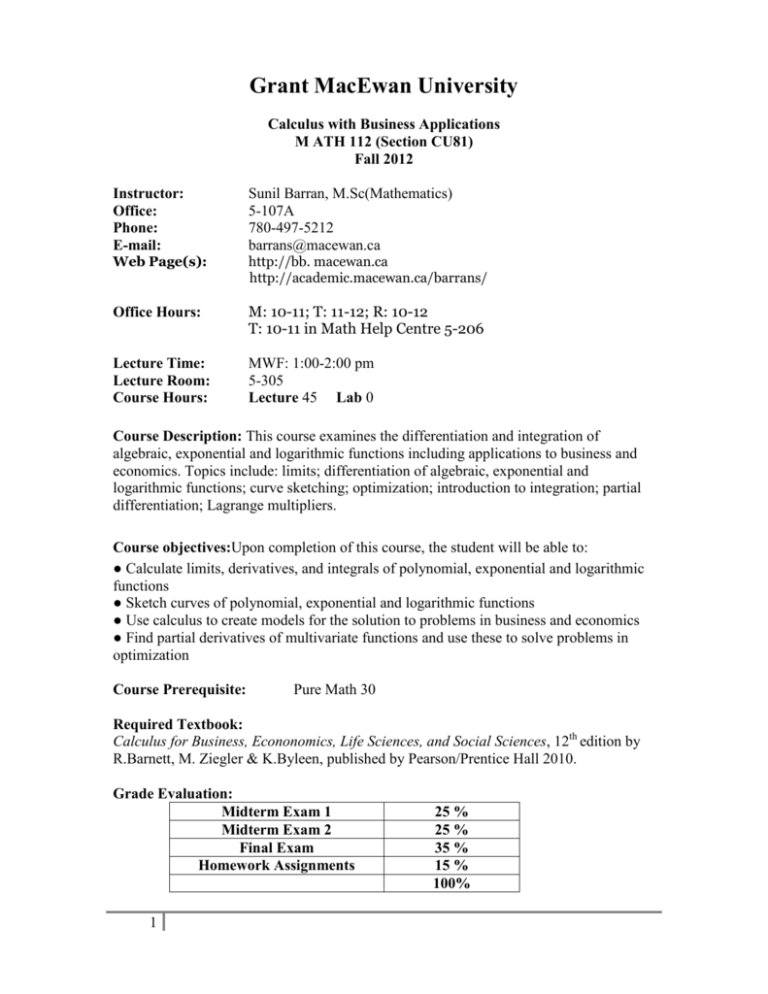
Grant MacEwan University
Calculus with Business Applications
M ATH 112 (Section CU81)
Fall 2012
Instructor:
Office:
Phone:
E-mail:
Sunil Barran, M.Sc(Mathematics)
5-107A
780-497-5212
barrans@macewan.ca
Web Page(s):
http://bb. macewan.ca
http://academic.macewan.ca/barrans/
Office Hours:
M: 10-11; T: 11-12; R: 10-12
T: 10-11 in Math Help Centre 5-206
Lecture Time:
Lecture Room:
Course Hours:
MWF: 1:00-2:00 pm
5-305
Lecture 45 Lab 0
Course Description: This course examines the differentiation and integration of
algebraic, exponential and logarithmic functions including applications to business and
economics. Topics include: limits; differentiation of algebraic, exponential and
logarithmic functions; curve sketching; optimization; introduction to integration; partial
differentiation; Lagrange multipliers.
Course objectives:Upon completion of this course, the student will be able to:
● Calculate limits, derivatives, and integrals of polynomial, exponential and logarithmic
functions
● Sketch curves of polynomial, exponential and logarithmic functions
● Use calculus to create models for the solution to problems in business and economics
● Find partial derivatives of multivariate functions and use these to solve problems in
optimization
Course Prerequisite:
Pure Math 30
Required Textbook:
Calculus for Business, Econonomics, Life Sciences, and Social Sciences, 12th edition by
R.Barnett, M. Ziegler & K.Byleen, published by Pearson/Prentice Hall 2010.
Grade Evaluation:
Midterm Exam 1
Midterm Exam 2
Final Exam
Homework Assignments
1
25 %
25 %
35 %
15 %
100%
Exam Dates:
Midterm 1: Friday October 12th in class
Midterm 2: Monday November 5th in class
Cumulative Final Exam: Friday December, 14th (pm) room TBD.
(Note: Students are responsible for verifying the date of the final exam when the final
exam schedule is posted later in the term.)
Format of Exams:
written, closed book, no calculators
Final Grade:
A+
A
AB+
B
BC+
C
CD+
D
F
95-100
90-94
85-89
80-84
75-79
70-74
65-69
60-64
55-59
50-54
45-49
0-44
Please Note:
1. Official final grades can be accessed through MyStudentSystem. Grant MacEwan
University adheres to the Alberta Common Grading Scheme, which is a letter
grade system. While instructors may use percentages to aid in their grade
development, only the letter grade will appear on transcripts.
2. A minimum grade of C- is required to receive transfer credit or to satisfy a
prerequisite for a higher level course.
3. A minimum grade of 40% on the final exam is required to obtain a grade of
C- or better in the course.
2
Student Responsibilities:
Students are expected to be aware of their academic responsibilities as outlined in
the Students’ Rights and Responsibilities section in the MacEwan Calendar.
1. ACADEMIC INTEGRITY: MacEwan’s Academic Integrity Policy (C1000)
promotes honesty, fairness, respect, trust, and responsibility in all academic work.
According to the policy, “All members of the University community have the
right to work and study in an environment of Academic Integrity and a
responsibility to protect Academic Integrity by being aware of this policy” (2.3).
The policy defines academic dishonesty as the following: “Academic dishonesty
involves participating in acts by which a person fraudulently gains or intentionally
attempts to gain an unfair academic advantage thereby compromising the integrity
of the academic process” (3.5). Here are four common forms of academic
dishonesty as outlined in the policy:
3.5.1 Cheating on Tests and Examinations: Copying the work of others or
the use, or attempted use, of unauthorized notes, information,
materials, study aids, or devices in any academic exercise or activity.
3.5.2 Plagiarism: The use and submission of another’s words, ideas, results,
work, or processes without providing appropriate credit to the
individual(s) responsible for same.
3.5.3 Improper Collaboration: Inappropriate sharing of work on an
assignment that was intended as an individual assignment or working
together in groups beyond the degree of permissible collaboration set
out by the instructor.
3.5.7 Multiple Submission: Submitting the same academic work in
multiple courses without permission of the instructor(s).
A more detailed description of academic dishonesty can be found in the Academic
Integrity Policy. Students are responsible for understanding what constitutes
academic dishonesty. All incidents of academic dishonesty are reported to and
recorded by the Office of Academic Integrity. The penalties for academic
dishonesty include the following:
a mark reduction up to zero on a piece of academic work
a grade reduction up to an F in the course
a requirement to withdraw (with transcript notation) from a program for a
specified period of time
expulsion from the University (with transcript notation)
Please see the Academic Integrity Policy at
https://facultycommons.macewan.ca/services/academic-integrity for more details.
2. REGISTRATION STATUS: You are responsible for your registration status at
MacEwan. Program Advisors may assist you with the process of registration,
including adding or dropping of courses, but it is your responsibility to verify that
these changes have been officially completed. This verification can be done at any
3
time using My Student System. You should check your official registration status
before the last date to officially withdraw from the course.
3. WITHDRAWING FROM THE COURSE: If you stop attending class you
must complete a Course Drop Form, have it signed by a Science Program
Advisor, and submit it to the Registrar’s Office by the last day to withdraw as
provided in the Academic Schedule in the MacEwan Calendar. Failure to
officially withdraw will result in a grade being assigned based on course work
completed. Late withdrawals are only allowed for exceptional circumstances.
4. EXAMINATIONS: Your student photo I.D. is required at examinations. It is at
the discretion of the instructor whether you will be allowed to write the
examination if you arrive over 15 minutes after the examination has begun. You
must remain in the examination room for at least 20 minutes from the time it
commenced. Electronic equipment (iPods, cell phones, etc.), other than
calculators that have been approved by the instructor, is not allowed to be used
during examinations. Permission to use the washroom during examinations is at
the discretion of the instructor and may require accompaniment.
5. MISSED TERM EXAMINATIONS: If you miss a term examination you must
provide the instructor with an explanation within 24 hours or a mark of zero may
be given. Notification may be provided through e-mail, voice mail, or direct
contact with the instructor. Official documentation as to why the examination was
missed will be needed to assess whether your absence will be excused or not. If
your absence is excused the weight of this examination will be added to the
weight of the final examination in the course. Medical excuses must include the
date you were examined, the specific dates for the period of the illness, a clear
statement indicating that the severity of the illness prevented you from attending
school or work, and the signature of the examining physician (a signature by
office staff on behalf of the physician is not acceptable). Medical notes obtained
subsequent to the date of the examination are generally not accepted. A mark of
zero will be given if the instructor considers the excuse inappropriate or
inadequately substantiated.
6. DEFERRED FINAL EXAMINATIONS: A deferred examination will be
granted if a student misses the final lecture examination for reasons considered by
the Science Department to be unavoidable (deferred examinations do not apply to
term or laboratory examinations). An application for a deferred examination must
be provided to the Science Department no later than two business days after the
date of the missed final examination. Application forms are available from the
Science Office and must be submitted with appropriate documentation. Students
should advise the instructor prior to the examination if they know beforehand that
they will be unable to attend the scheduled examination time. Deferred
examinations are granted by a Chair in the Science Department, not by the course
instructor. If you have any questions about the process please call the Science
office.
4
7. LATE ASSIGNMENTS: Medical and other excuses are generally not accepted
as a reason for late assignments as due dates for these assignments are generally
known in advance.
8. CELL PHONES: Cell phones are to be turned off during lectures, laboratories,
seminars, and examinations (except under exceptional circumstances in which
approval has been given by the instructor).
9. STUDENTS WITH DISABILITIES: Students with disabilities who may have
special requirements in this course are advised to discuss their needs with
Services to Students with Disabilities located in the Student Resource Centre. You
should advise the course instructor(s) of any special needs that are identified. See
Policy E3400 Students with Disabilities.
10. STUDENT APPEALS: MacEwan has a policy regarding Student Appeals
(E3103). You should access this policy to become aware of the deadlines and
guidelines that need to be followed if you are appealing a grade or other
University assessment.
11. MYMAIL.MACEWAN EMAIL: All students are given a
<name>@mymail.macewan.ca e-mail address. This e-mail address is available
to the course instructor who may distribute relevant course information or
announcements via e-mail. The Science Program regularly communicates with the
students via e-mail. Check your mymail.macewan.ca e-mail regularly or forward
it to an e-mail address you check regularly. If you use e-mail to communicate
with your instructor you must use your mymail account. This is to protect your
privacy; if a non-mymail account is used, there is no way for an instructor to
verify the identity of the sender.
12. OTHER: a) Calculators are not allowed during examinations. b) Internet use is
not permitted during class. c) Texting is not permitted in class.
Disclaimer: The information in this Course Outline is subject to change; any
changes will be announced and distributed to the class or, if applicable, in the
laboratory.
Procedure for submission of assignments:
1. Assignments will be posted on Blackboard(http://bb. macewan.ca )
and also on the course website (http://academic.macewan.ca/barrans/).
2. Assignments are to be handed in at the beginning of class to your instructor on
their respective due dates. Late assignments are not accepted.
3. Please use clean edged standard letter-size paper.
4. Make a habit of doing neat and presentable work: if the grader has difficulties
when deciphering what you have written, the problem will not be graded, and the
respective credit will be 0.
5
5. Show all your work and explain the steps of your solution; explain them in
words if necessary: the grader is not supposed to guess what you mean, - it must
be written.
6. If you have more than one sheet, please staple them together properly. Do not
use paper clips or other devices.
7. If an assignment is not completed and delivered according to the above
procedure, it will be immediately recycled and the grade 0 will be assigned.
8. When you receive the marked assignments, make sure that the marks are totalled
correctly. Try to do your best to understand your mistakes. In order to do this you
may try to solve the problem again and /or compare your solution/answer with the
solution posted on Blackboard. Make a habit of checking your marked solutions
with those posted even if the marker assigned you a perfect score. This will serve
not only as a review, but it may possibly also bring to your attention an alternate
approach to solving problems and may even identify, to your advantage, the
situation where the marker may have given you credit for an incorrect solution!
This is very rare, but this knowledge will spare you from losing valuable marks in
examinations, and also serve as your personal quality control device.
9. If you disagree with the grade assigned by your grader for a certain problem or
if some grades are missing or they are not totalled correctly, write a clear
message on a separate page for your grader, staple it to your assignment and
hand in with your next assignment. If after reading the answer from your
grader, the conflict has not been resolved and you think you are right and your
grader is wrong, bring your assignment and the correspondence to the instructor.
Logging in to Blackboard for Students
Step 1. In the address bar of your Web browser, type http://myMacEwan.ca and press
Enter.
Step 2. Login to myMacEwan.ca with your MacEwan network user ID and password.
Step 3. Click on “Distance and Online Learning” tab
Note: Your initial password has been determined for you and is printed on your course
registration sheet. Most often the id’s are assigned as Last name and first initial. With the
first letter of your last name and first initial being capitalized. For example:
First Name: Jack
User Id: HenryJ
If you do not know your
Last Name: Henry
Password: 1234567
MacEwan Network ID or
Student Number:
password please contact the
1234567
CNS HelpDesk at 497-4357,
or visit them in person in
room 7-306.
6
Lecture Topics: The following are the sections of the text that will be covered
Chapter 1
A library of elementary functions
1.1
Linear Equations and Inequalities
1.2
Graphs and lines
Chapter 2
2.1
2.2
2.3
2.5
2.6
Functions and Graphs
Functions(Week 1)
Elementary Functions: Graphs and Transformations
Quadratic Functions
Exponential Functions
Logarithmic Functions(Week 2)
Chapter 3
3.1
3.2
3.3
3.4
3.5
3.6
3.7
Limits and Derivatives
Introduction to limits
Infinite limits and limits at infinity
Continuity
The Derivative(Week 3)
Basic Differentiation properties
Differentials
Marginal Analysis in Business and Economics
Chapter 4
4.1
4.2
4.3
4.4
4.5
Additional Derivative topics
The constant e and Continuous Compound Interest (Week 4)
Derivatives of exponential and logarithmic functions
Derivatives of products and quotients(Week 5)
The Chain Rule
Implicity Differentiation(Week 6)
Chapter 5
5.1
5.2
5.3
5.4
5.5
5.6
Graphing and Optimization
First Derivative and Graphs
Second Derivative and Graphs(Week 8)
L’Hospital’s Rule
Curve Sketching Techniques
Absolute Maxima and Minima(Week 9)
Optimization
Chapter 6
6.1
6.2
6.3
6.4
6.5
Integration
Antiderivatives and Indefinite integrals(Week 10)
Integration by Substitution
Differential Equations; Growth and Decay(Week 10)
The Definite integral
The Fundamental Theorem of Calculus
Chapter 8
8.1
8.2
8.3
8.4
Multivariable Calculus
Functios of Several Variables(Week 11)
Partial Derivatives
Maxima and Minima(Week 12)
Maxima and Minima using Lagrangian Multipliers(Week 13)
7

